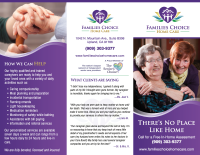When you visit your aging parents, do you notice anything that seems out of place? Perhaps there is a lot of laundry piling up that hasn’t been washed, or the lawn hasn’t been mowed in months.
These are two signs your loved ones need in-home care. Considering that only 5% of adults age 65 and older live in nursing homes today, this indicates many elderly people are relying on having a professional visit to provide support. It’s a wonderful alternative to assisted living, allowing the individual to remain in their familiar residence and retain some independence.
But how do you know when your loved ones have reached a point where you need to arrange in-home care for them? While it’s common to slow down as we age, it’s important to recognize the warning signs that indicate they’re struggling. If you’re a child of elderly parents, here are eight signals they need in-home care.
1. They Can’t Keep Their Home Clean
One of the first signs that an elderly loved one needs help is an unkempt, cluttered, or dirty home. They may no longer be capable of the physical activity and stamina needed to push a vacuum cleaner around and reach up to dust shelves.
Poor eyesight can further compound the problem, as the elderly person may not be able to see cobwebs, dust, and grime that has formed in their home. They may also leave spoiling food on the counter or the fridge may be full of expired items that haven’t been tossed. All of this can create unsanitary conditions and attracts pests.
In-home care can help with daily housekeeping tasks to keep an elderly person’s home clean and tidy.
2. They Can’t Prepare Meals For Themselves
Proper nutrition is essential as we age, yet many older people may find it difficult to cook meals for themselves as they age. It may be because they lack the physical strength to lift a baking sheet to place in an oven or heavy pots. They may also find following directions in a recipe confusing or are unable to deal with the clean-up afterward.
In-home care can help an elderly person safely cook and prepare healthy meals, store leftovers, and wash the dishes.
3. The Yard Needs a Lot Of Work
When walking, kneeling, and moving around outdoors becomes impossible, an elderly homeowner’s yard will give this away. Their lawn will overgrow and get covered by leaves and other debris. Weeds may take over gardens and grassy areas.
In-home care can help an older adult not only keep the insides of their home presentable, but can do yard work as well.
4. They Can’t Groom And Dress Themselves Easily
An aging person can find the basic habit of getting washed up and dressed challenging. They may remain in their bedtime clothing and bathrobe all day and go for periods without bathing or washing. Their hair and nails may be dirty.
When personal hygiene falls by the wayside, this is a strong indication your loved one needs in-home care. They can assist them with safely bathing or showering, hair care, brushing their teeth, and making sure they are clean and presentable.
5. Walking Up Stairs Is A Struggle
Walking up stairs is often challenging for the elderly, especially as they lose muscle mass and strength or they must deal with arthritis or other chronic health conditions. If their bathroom and bedroom is on another level, they may forego washing and grooming because it’s too difficult to walk up the stairs.
Although a chairlift is an ideal solution in this situation, in-home care can help them maneuver steps or retrieve items for them that are located on another floor.
6. They Struggle To Pay Bills On Time
Research indicates that when aging begins affecting our cognitive abilities, our financial skills are the first to go. It’s common for elderly people to forget to pay their bills, bounce checks, and struggle to balance their checking accounts.
Sadly, older people lose $3 billion each year to scammers. fallen victim to a money scam. If a loved one can’t stay on top of their budget, it’s imperative for someone to step in and take over their finances so they don’t risk more late fees or flag the attention of credit collection agencies.
7. They Can’t Remember Appointments
Missing doctor visits, other important appointments, and birthdays also indicates an older person needs in-home care to help them stay on top of their calendar. They may get confused on what day of the week it is, or when bills need to be mailed.
Many older people often forget to take their medication on time, or they may stop using a prescription altogether which can put their health in jeopardy.
In-home care can help them stay on top of everything on their schedule.
8. They Injure Themselves Easily
It can become tougher for seniors to keep their balance as their age, and they may not be willing to admit to family members that they’ve hurt themselves. If your elderly parents have unexplained bruises are sores, it could indicate they’re falling or having accidental mishaps in their home.
In-home care will ensure they can move safely in their living spaces, and can also make recommendations for home upgrades for fall prevention.
Know the Signs Your Aging Parents Need In-Home Care
Keep in mind that your aging parents’ abilities and health can change rapidly. Sometimes a person who seemed physically able to carry out daily tasks can find the same ones tough to complete a month or few months later. Spotting any of the eight signs above early on will give you time to hire in-home care for your loved ones before they can cause injury or harm to themselves.
Here at Families Choice Home Care our in-home professionals can perform light housekeeping, personal care, sleep over, offer transportation, and provide other services to your elderly loved ones. Contact us to learn more about your in-home care services.






